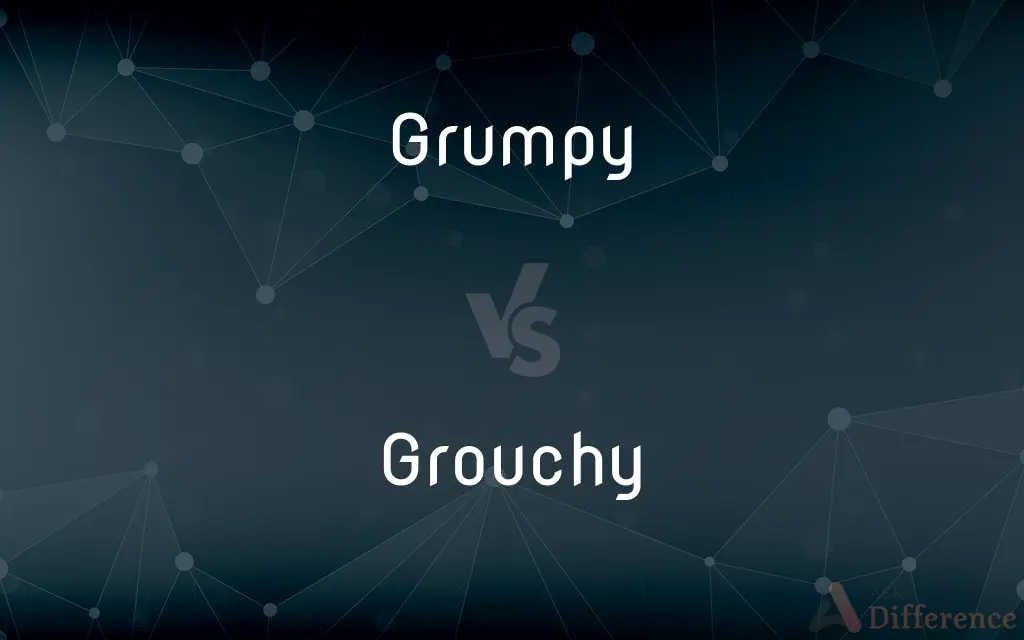Grumpy vs. Grouchy — What's the Difference?
By Tayyaba Rehman & Urooj Arif — Updated on April 5, 2024
Grumpy often refers to a temporary mood of irritation, while grouchy can imply a more consistent, often less intense, state of irritability.

Difference Between Grumpy and Grouchy
Table of Contents
ADVERTISEMENT
Key Differences
Grumpy is typically used to describe someone who is irritable or annoyed, often due to specific circumstances or times, such as being tired or hungry. This mood is usually temporary and can change with the situation. On the other hand, grouchy describes a more general, persistent state of irritability or complaining, not always linked to specific conditions or easily changed.
Grumpy individuals might exhibit their moodiness in short, intense bursts, reacting to specific triggers that disturb their peace or comfort. These reactions are often visible in facial expressions or short responses. Grouchy people, however, might maintain a consistent level of irritability that permeates their interactions, regardless of the situation, and might not need an immediate trigger to display their mood.
The term grumpy can sometimes be seen in a more endearing light, often attributed to someone whose irritation is seen as temporary and understandable, like a lovable character who is grumpy before their morning coffee. Grouchy, however, carries a slightly more negative connotation, suggesting a habitual state that is less charming and more taxing on others.
Grumpy behavior is often more acceptable in social contexts, as it's understood to be a temporary state that anyone can experience. Conversely, being grouchy might be viewed more critically, as it suggests a consistent personality trait that could affect one's social interactions and relationships more deeply.
In popular culture, grumpy characters often have moments of warmth and kindness, showing that their irritability is only surface deep. Grouchy characters, however, may require more significant character development or external interventions to overcome their persistent irritability, illustrating a deeper narrative of personal growth or change.
ADVERTISEMENT
Comparison Chart
Definition
Showing irritation or bad mood from annoyance or discomfort.
Habitually irritable and complaining, often without a specific cause.
Duration
Temporary, often situation-specific.
Persistent, not necessarily linked to specific situations.
Perception
Sometimes seen as endearing or understandable.
Generally viewed negatively as a less appealing trait.
Social Impact
Minimal, as the mood is temporary and can be easily resolved.
More significant, can affect long-term relationships and interactions.
Cultural Examples
A character grumpy from lack of sleep but otherwise pleasant.
A character who is consistently irritable, affecting their social interactions.
Compare with Definitions
Grumpy
A mood of irritability or annoyance, often temporary.
She felt grumpy after missing her morning coffee.
Grouchy
Less likely to change quickly or easily.
Even good news did little to lighten his grouchy mood.
Grumpy
Reflecting dissatisfaction with a particular situation.
The grumpy customer complained about the cold food.
Grouchy
Characterized by a habitual state of complaining or irritability.
The grouchy old man scolded the noisy children.
Grumpy
Can be associated with physical discomfort or tiredness.
The long hike made him grumpy and sore.
Grouchy
Can imply a deeper personality trait.
Her grouchy demeanor made her difficult to approach at work.
Grumpy
Sometimes used affectionately for someone's mood.
Her grumpy face in the morning is secretly adorable to her partner.
Grouchy
Affects one’s overall disposition and interactions.
He's been grouchy all week, affecting everyone's mood.
Grumpy
Exhibited through short, often abrupt responses.
His grumpy replies made it clear he hadn't slept well.
Grouchy
Often not tied to specific events or triggers.
Despite the sunny day, he was still grouchy.
Grumpy
Surly and peevish; cranky.
Grouchy
Tending to complain or grumble; peevish or grumpy.
Grumpy
Dissatisfied and irritable.
The old man was grumpy because he couldn’t find his glasses.
Grouchy
Irritable; easily upset; angry; tending to complain.
His boss gets grouchy when deadlines draw near.
Grumpy
Surly; dissatisfied; grouty.
Grouchy
Given to complaining or grumbling; prone to show annoyance at slight provocation; irritable.
Grumpy
Perversely irritable
Grouchy
Perversely irritable
Common Curiosities
How does being grouchy affect relationships?
It can strain relationships due to consistent negativity or irritability.
What causes someone to be grumpy?
Temporary irritations, lack of sleep, hunger, or discomfort.
Is being grumpy a personality trait?
No, it’s more of a temporary state than a trait.
Can grumpy and grouchy be used interchangeably?
While often used similarly, grumpy typically implies a temporary mood, whereas grouchy suggests a more persistent state.
Can a grumpy person be generally happy?
Yes, a grumpy person can be generally happy and positive outside of their temporary irritations.
Does weather affect someone being grumpy or grouchy?
Certain weather conditions can affect mood, potentially leading to grumpiness or grouchy behaviors.
Are children described as grumpy or grouchy?
Children can be described as both, depending on whether their irritability is temporary or more consistent.
Do animals exhibit grumpy or grouchy behaviors?
Yes, animals can appear grumpy or grouchy, often reflecting discomfort or dissatisfaction.
Is it normal to feel grumpy often?
Occasional grumpiness is normal, but frequent irritability might need attention.
How can one manage a grouchy attitude?
Through self-awareness, stress management techniques, and sometimes professional help.
Can lack of social interaction make someone grouchy?
Yes, isolation or lack of social engagement can contribute to irritability.
Is there a genetic component to being grouchy?
Personality traits, including tendencies towards irritability, can be influenced by genetics.
What’s the best way to approach a grouchy individual?
With patience, understanding, and sometimes addressing underlying issues.
Can lifestyle changes reduce grouchiness?
Yes, improvements in diet, exercise, and sleep can positively impact one's mood.
How do cultural perceptions of grumpy and grouchy differ?
Cultural norms influence the acceptance and interpretation of these moods, with some cultures finding grumpy behaviors more socially acceptable than others.
Share Your Discovery

Previous Comparison
Heavy vs. Big
Next Comparison
Dharma vs. DhammaAuthor Spotlight
Written by
Tayyaba RehmanTayyaba Rehman is a distinguished writer, currently serving as a primary contributor to askdifference.com. As a researcher in semantics and etymology, Tayyaba's passion for the complexity of languages and their distinctions has found a perfect home on the platform. Tayyaba delves into the intricacies of language, distinguishing between commonly confused words and phrases, thereby providing clarity for readers worldwide.
Co-written by
Urooj ArifUrooj is a skilled content writer at Ask Difference, known for her exceptional ability to simplify complex topics into engaging and informative content. With a passion for research and a flair for clear, concise writing, she consistently delivers articles that resonate with our diverse audience.
















































